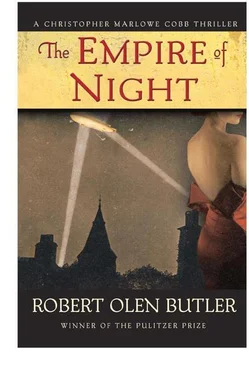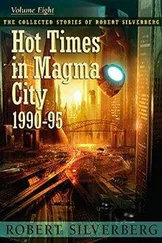I said, “I can’t shake the feeling he’s up to more.”
Jeremy and I let my hunch hang between us for a moment.
I nodded at the boxes. “The first dud they drop and our bosses have this much. You and I grab these now, Stockman still has his designs, and we can do no more.”
“Then shall we let this be?” he said.
This needed no answer. Together we turned and crossed the room. He switched off the lights, and I reset the lock on the door.
On the way to the main warehouse floor we devised a little ruse for the guard, who could have recovered his mind by now.
And so Jeremy and I ransacked the shipping office, arguing in German about which of us stupidly suggested the money would be in something other than an actual safe.
I’d earlier noticed some cases of what looked like a pretty damn good bock and we stole one of those, for appearances sake, and we argued some more — out of the hog-tied guard’s line of sight — with me insisting on searching him for cash so we’d at least leave here with a little ready money and with Jeremy talking me out of it, saying this guy was just here doing his job and his aching jaw was enough trouble for him for one night.
Then we beat it out the loading dock door and back to the Ford with our case of beer.
We stopped at the curb a block before the hotel. From the wide median, the streetlights were shining through a scrim of linden trees.
“How do we meet again?” I said.
“You still have a room at the Baden?”
“I do.”
“I can leave a message there for you,” he said.
“And if I need to get you ?”
There was an odd hesitation in him, which I wished I could read. But it was dark inside the Ford and he turned his face away. Whatever it was passed quickly.
“For the next few days you can reach me at this telephone.” He reached quickly inside his coat. If he were anyone else I’d be drawing my Mauser.
His hand emerged with a piece of paper, which I took from him.
“They listen in on the phones at the Adlon,” he said.
“I know.”
“The lobby of the Baden has a telephone kiosk. You can call from there. Say as little as possible.”
“Let’s decide on a place that need never be mentioned.”
“Yes,” he said. “Make it the Hindenburg statue in the Tiergarten.”
“But we speak of beer.”
“Or brat, depending on the time of day.”
“One other thing,” I said. “I don’t know who you are.”
“A pretty good middleweight who once upon a time almost beat Tommy Ryan.”
I’d meant around Berlin. On the phone. This answer came quick and dry. His German sense of humor. Or his German Angst . Or both.
But he played neither, giving the line only a brief beat before appending, “I am Bruno Obrecht. A Swiss businessman.”
I started to get out of the still idly quaking Model T.
He put a hand on my arm. “But not for the next two days.”
I sat back down.
“I am Erich,” he said. “Erich Müller.”
“Was that your birth name?”
“It was.”
I stepped out of the T, and he said, “You want a couple of our bocks for your room?”
“Take them all,” I said.
He pinched the brim of his hat to say good-bye and drove off.
I looked at the paper in the streetlight. His telephone number. Spandau 4739 .
He was going home to his mother.
I stood for a moment on the street. An El train was softly clacking through the median lindens. I considered this roll of the dice, the opportunity we’d just left behind. Perhaps the content of the two boxes was all I’d come to Berlin to find. What we felt certain was in there could be everything there was to know about the sotto voce declaration I’d finessed from Stockman last night. If the bombs the Zepps were dropping could somehow be improved, made more accurate, more effective, the airship attacks might become far more than isolated, neighborhood disruptions. They might bring the war-changing terror to London that many people on both sides felt was possible from these machines. The Brits deserved to know the details of what they were up against as soon as possible. They needed to start making their own.
So why weren’t those two boxes on their way to the American embassy right now?
Instead, I’d stolen some beer.
“Shit,” I said.
No. “Shit” was what was in my head, certainly. But what I said aloud there on the Unter den Linden, what rang in the silence following the passing of the El, was Scheiße .
I was thinking in German and maybe I was just a little too close to this place right now.
However.
The British had no aerial attack of their own. They’d see plenty of this design long before they’d have their own airship. Surely it was better for now to keep the Germans confident about their security inside the Fatherland.
And I still had a reporter’s niggling hunch.
I instantly questioned even that. Maybe that hunch was simply the feature writer in me. Stockman intrigued me. I wanted to get into his head. I had one foot in already. But maybe the only hard news he had in there was still sitting in Reinauer’s office.
I tried to shake all this off.
I made myself walk. I let the blandly neoclassic, granite ashlar face of the Education Ministry scour my mind clean.
Spinning in the Adlon’s front door I left the doubts behind. I had no choice but to play my hunches now. And I played one more.
I turned to the left and stepped into the doorway of the bar. In the far corner, drinking alone in an evening suit, was Sir Albert Stockman. He was sitting where he’d sat last night, his back to the rest of the bar.
I began to cross the floor, and he turned in his chair. It was an odd moment; I felt, chillingly, that he somehow sensed my approach. But he was actually seeking the bartender’s attention. I drew near and now he did see me and he instantly rose, turning to face me. He said, in German, “Please. Yes. Come sit.”
We shook hands.
I sat in the chair where I’d sat last night.
Stockman motioned to the bartender and sat down as well.
On the table before him was an empty whiskey glass.
Stockman saw me looking at it.
He said, in English, “They have a splendid American rye. Not to the taste of most Germans. They don’t drink whiskey. But I have acquired some British tastes. I wanted this tonight.”
The glass was empty, but now that Stockman was sitting and speaking, an afterwhiff of spirits floated past me. He’d been drinking for a while.
Last night’s bartender appeared.
“Don’t feel obligated,” Stockman said.
“Not at all,” I said. “I’ll drink American with you.”
“The bottle, Hans,” Stockman said to the bartender, who nodded with a click of his heels and did a smart about-face.
Stockman instantly asked, “Were you with Madam Cobb?”
I still found it difficult to trust how I stood with him. I had a quick pulse of worry. This morning she had made me up into another man so that I could spy on Sir Albert. But he’d delivered the message himself, that I was to see her. Then why was he asking?
“This morning,” I said. “At the theater.”
“So. Yes. She and I had dinner tonight.” He was speaking German again. “An early dinner before she returned to the theater. Were you at the rehearsal?”
“Not this evening,” I said. “They are very busy. Working late. She has two casts to deal with, you realize. One German-speaking.”
“I know,” he said. “It wearies her.”
Hans the bartender appeared beside us.
He put a glass in front of me and poured two amber fingers of rye in mine and two in Stockman’s glass.
Читать дальше












